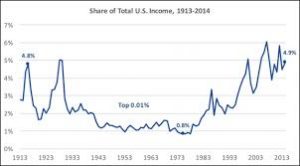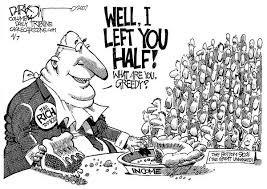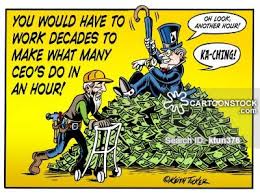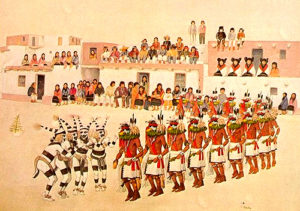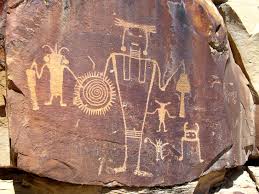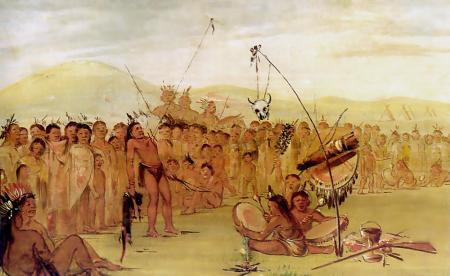Natural religion contains many anticipations of the true religion. Man yearned for a savior from the darkness and death that reigns over this world, and that yearning was expressed in myths, which were fulfilled in Christ.
Inequality has become a leitmotif of contemporary politics.
The enormous gap between multi-billionaires and those who get by on a dollar a day is disturbing.
I am dubious about state control. Billionaires don’t have their wealth in pools of gold coins in their basement, which they dive into like Scrooge McDuck.
They invest the vast portion of their wealth in businesses which provide employment, and in general the market, rather than the state, is better mechanism to decide where to invest, as the fate of the Soviet Union showed. China has moved hundreds of millions out of poverty through market-determined investment.
But still, the vast discrepancy in wealth and income is disturbing, and other societies have felt the same way about great differences in wealth among their members.
We once attended a kachina dance at a Hopi pueblo. It was held in the plaza of the pueblo. Native Americans of all ages lined the plaza, the adults and children in chairs on the ground, the teenagers on the roof. There were a handful of Anglos. There was a pile of something in the center surmounted by a spruce tree.
Scores of Corn Boy kachinas began milling into the plaza, and formed a double line around the plaza. They began to sing and dance in a restrained and elegant fashion. The song was strophic and melodious to the Western ear. Later I asked what they were singing. It was a prayer for rain and crops and health, first for the Hopis and then for the whole world, because Hopi, as is well known, is the center place, the axis of the world, and has the responsibility to pray for the whole world.
Many think the spiral represents the search for the Center Place
After an hour or so the dance broke up and the kachinas began taking items from the pile. It was a pile of food: baskets of staples for the grandmothers, cookies for the children. The distribution became more and more energetic. The kachinas began tossing muffins to people of the rooftop: food was raining from heaven. After that, the kachinas reformed their lines and sang and danced for another hour. After the dance, everyone, including we Anglos, were invited into houses to feast.
This was a thanksgiving dance. Hopis, when they have a great prayer request or a thanksgiving to make, sponsor one of these dances. In the past they were often held in late winter, when some families’ supplies were running short, and were a means to distribute food. But the distribution was done not directly, but through the agency of the kachinas, the guardian spirits, who were themselves agents of the Creator.
Among the Plains Indians the Sun Dance was a prayer of petition. Human beings, especially men, have often felt that prayer must be accompanied by real physical sacrifice to demonstrate its sincerity. Fasting, continence, pilgrimage, beatings often accompany prayer, especially among men. The Sun Dance is an extreme manifestation of this:
Those who had pledged to endure the Sun Dance generally did so in fulfillment of a vow or as a way of seeking spiritual power or insight. Supplicants began dancing at an appointed hour and continued intermittently for several days and nights; during this time they neither ate nor drank. In some tribes supplicants also endured ritual self-mortification beyond fasting and exertion; in others such practices were thought to be self-aggrandizing. When practiced, self-mortification was generally accomplished through piercing: mentors or ritual leaders inserted two or more slim skewers or piercing needles through a small fold of the supplicant’s skin on the upper chest or upper back; the mentor then used long leather thongs to tie a heavy object such as a buffalo skull to the skewers. A dancer would drag the object along the ground until he succumbed to exhaustion or his skin tore free. Among some tribes the thongs were tied to the centre pole, and the supplicant either hung from or pulled on them until free. Piercing was endured by only the most committed individuals, and, as with the rest of the ritual, it was done to ensure tribal well-being as well as to fulfill the supplicant’s individual vow.
Typically, the sun dance is a grueling ordeal for the dancers, a physical and spiritual test that they offer in sacrifice for their people. According to the Oklahoma Historical Society, young men dance around a pole to which they are fastened by “rawhide thongs pegged through the skin of their chests.”
While not all sun dance ceremonies include piercing, the object of the sun dance is to offer personal sacrifice for the benefit of one’s family and community. The dancers fast for many days, in the open air and whatever weather occurs.
Anglos were horrified by this ritual and banned it.
In God’s Red Sun, Louis Warren describes another important part of the Sun Dance ritual and the consequence of the ban:
…the ban ramped up social friction. A Sun Dance was usually accompanied by a large-scale transfer of goods from richer Lakotas to poorer members of the tribe. Each year’s dance was sponsored by a person who had taken a vow to Wi [the Sun god] to host the ceremony, often in return from deliverance from danger or illness. As the date for the dance approached, the sponsor sacrificed all of his property by surrendering it to the needy. Other wealthy people also gave generously to the poor as the ceremony progressed. Each gift of horses, buffalo robes, or richly beaded cloth from rich to poor encouraged the spirits to be similarly kind to Lakotas, or as Lakotas put it, “to take pity” on them. This, the “vast amount” of wealth that changed hands during the ritual eased tensions among Lakotas and bound them together in reciprocal obligation.
There are striking resemblances to the Todah, the thanksgiving sacrifice of the Jews for deliverance from death or danger, and its fulfillment in the Eucharist. Paul in 2 Corinthians 8 places Christian’s help for one another in the context of the gift that God made of Himself:
We want you to know, brethren, about the grace of God which has been shown in the churches of Macedonia, 2 for in a severe test of affliction, their abundance of joy and their extreme poverty have overflowed in a wealth of liberality on their part. 3 For they gave according to their means, as I can testify, and beyond their means, of their own free will, 4 begging us earnestly for the favor of taking part in the relief of the saints— 5 and this, not as we expected, but first they gave themselves to the Lord and to us by the will of God. 6 Accordingly we have urged Titus that as he had already made a beginning, he should also complete among you this gracious work. 7 Now as you excel in everything—in faith, in utterance, in knowledge, in all earnestness, and in your love for us—see that you excel in this gracious work also.
8 I say this not as a command, but to prove by the earnestness of others that your love also is genuine. 9 For you know the grace of our Lord Jesus Christ, that though he was rich, yet for your sake he became poor, so that by his poverty you might become rich. 10 And in this matter I give my advice: it is best for you now to complete what a year ago you began not only to do but to desire, 11 so that your readiness in desiring it may be matched by your completing it out of what you have. 12 For if the readiness is there, it is acceptable according to what a man has, not according to what he has not. 13 I do not mean that others should be eased and you burdened, 14 but that as a matter of equality your abundance at the present time should supply their want, so that their abundance may supply your want, that there may be equality. 15 As it is written, “He who gathered much had nothing over, and he who gathered little had no lack.” (RSV)
Paul emphasizes that this is not a command, which a state redistribution of wealth would be, but a counsel to a generosity motivated by thanksgiving for the generosity that God has shown to us. This is the Christian fulfillment of the intuition that motivate Hopi and Lakota to their rituals of sacrifice and sharing. Paul gives a counsel, not a command, but I am sure he would say it would be shameful if Christians were outdone in generosity to one another by pagans who have not heard the Gospel.
